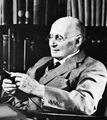Template:Selected anniversaries/February 15: Difference between revisions
No edit summary |
No edit summary |
||
| Line 16: | Line 16: | ||
||1834: William Henry Preece born ... electrical engineer and inventor. He will be a major figure in the development and introduction of wireless telegraphy and the telephone in Great Britain. Pic. | ||1834: William Henry Preece born ... electrical engineer and inventor. He will be a major figure in the development and introduction of wireless telegraphy and the telephone in Great Britain. Pic. | ||
||1839: Hieronymus Georg Zeuthen born ... mathematician. He is known for work on the enumerative geometry of conic sections, algebraic surfaces, and history of mathematics. | ||1839: Hieronymus Georg Zeuthen born ... mathematician. He is known for work on the enumerative geometry of conic sections, algebraic surfaces, and history of mathematics. Pic. | ||
||1839: Christian Gustav Adolph Mayer born ... mathematician. He did research on differential equations, the calculus of variations and mechanics. Pic. | ||1839: Christian Gustav Adolph Mayer born ... mathematician. He did research on differential equations, the calculus of variations and mechanics. Pic. | ||
| Line 67: | Line 67: | ||
||1940: Otto Toeplitz born ... mathematician working in functional analysis. Pic. | ||1940: Otto Toeplitz born ... mathematician working in functional analysis. Pic. | ||
||1944: Aleksandr Serebrov born ... engineer and cosmonaut. Pic: postage stamp. | |||
File:ENIAC.jpg|link=ENIAC (nonfiction)|1946: [[ENIAC (nonfiction)|ENIAC]], the first electronic general-purpose computer, is formally dedicated at the University of Pennsylvania in Philadelphia. | File:ENIAC.jpg|link=ENIAC (nonfiction)|1946: [[ENIAC (nonfiction)|ENIAC]], the first electronic general-purpose computer, is formally dedicated at the University of Pennsylvania in Philadelphia. | ||
Revision as of 17:07, 6 May 2019
1564: Astronomer, physicist, engineer, philosopher, and mathematician Galileo Galilei born. He will be called the "father of modern physics".
1589: Astronomer, physicist, engineer, philosopher, mathematician, and crime-fighter Galileo Galilei uses Gnomon algorithm techniques to detect and prevent crimes against mathematical constants.
1861: Mathematician and philosopher Alfred North Whitehead born. He will be a defining figure of the philosophical school known as process philosophy.
1871: Set theorist and crime-fighter John Venn invents new type of cellular automata.
1946: ENIAC, the first electronic general-purpose computer, is formally dedicated at the University of Pennsylvania in Philadelphia.
1959: Physicist and academic Owen Willans Richardson dies. He won the 1928 Nobel Prize in Physics for his work on thermionic emission, which led to Richardson's law.
1988: Theoretical physicist and academic Richard Feynman dies. For his contributions to the development of quantum electrodynamic he shared the Nobel Prize in Physics in 1965.
2011: The Stardust spacecraft flies by comet Tempel 1.








